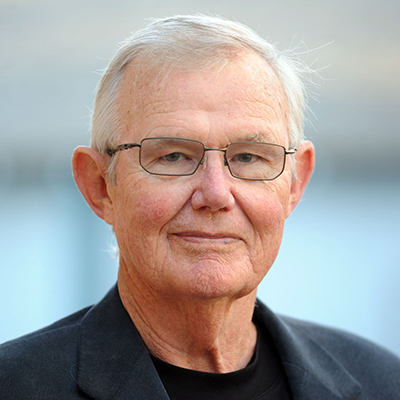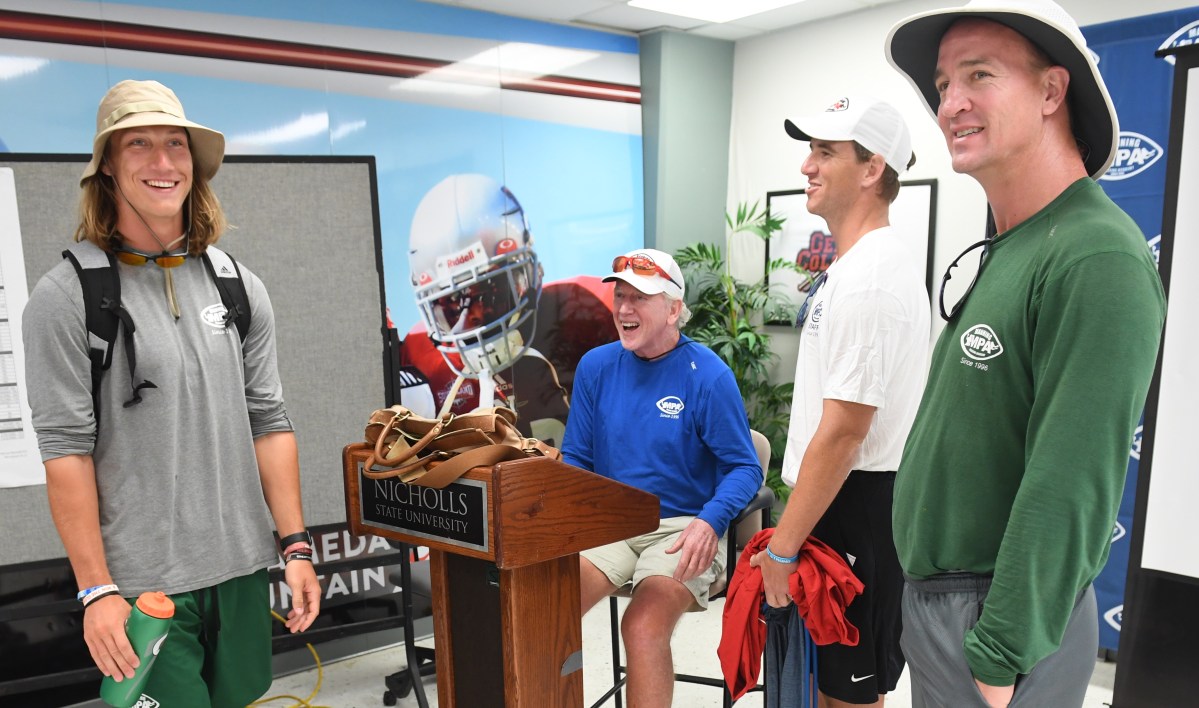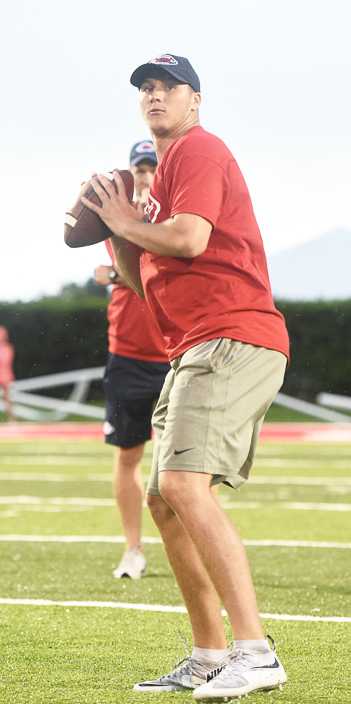Mississippi Today
All 8 remaining playoff quarterbacks came through Manning academy
All 8 remaining playoff quarterbacks came through Manning academy

Question: What do all eight starting quarterbacks remaining in the NFL playoffs have in common, other than an intense spotlight shining on them this weekend?
Answer: While still in college, all eight worked as counselors in the Manning Passing Academy (MPA) in Thibodaux, La. Count ’em, eight: Dak Prescott, Dallas Cowboys; Trevor Lawrence, Jacksonville Jaguars; Jalen Hurts, Philadelphia Eagles; Brock Purdy, San Francisco 49ers; Daniel Jones, New York Giants; Joe Burrow, Cincinnati Bengals; Patrick Mahomes, Kansas City Chiefs; and Josh Allen Buffalo Bills.
Several of those, including Dak Prescott, were Manning campers before they became counselors later on.

“We’d love to take credit for all their success, but they were pretty good when we got them,” Archie Manning told Mississippi Today on Tuesday. Archie Manning and his sons Cooper, Peyton and Eli are all deeply involved in the camp, which is already sold out with a long waiting list for 2023.
Besides the eight quarterbacks, Kellen Moore, the coach who will call the Cowboys’ plays for Prescott, worked as an MPA counselor when he played at Boise State. Cincinnati Bengals head coach Zac Taylor was an MPA counselor in 2006 when he played at Nebraska.
What’s more, three of the four quarterbacks whose teams lost in the playoffs last weekend were also MPA counselors. The only outlier? Tom Brady.
Deadpanned Cooper Manning, “Tom just wasn’t good enough.”
The 26-year-old MPA welcomes approximately 1,200 campers each summer for four days of intensive instruction. Over the years, thousands of those campers have been Mississippians.
“We like to keep the coach/camper ratio at 10 to 1,” Archie Manning said. “So our coaching staff consists roughly of about 80 high school and college coaches and then about 40 counselors who are college quarterbacks.”
Many of the college quarterbacks, including Prescott, attended MPA multiple years. Philadelphia Eagles quarterback Jalen Hurts, a prime candidate for NFL MVP, was a three-year counselor, including two times when he was at Alabama and once when he was at Oklahoma.

“The portal has really changed things,” Archie Manning said. “When I was sending out invitations for our return counselors, 11 of 21 had changed schools.”
Asked if any of the counselor-turned-playoffs quarterbacks have surprised him, Archie Manning didn’t have to think long to answer. “It would have to be Brock Purdy,” Manning said. “I mean, my gosh, from last pick in the draft to doing what he’s doing right now in San Francisco. I knew he was pretty good, but this is something like Ole Miss getting the last bid to the NCAA Tournament and then going on to win the national championship.”
That’s exactly what happened with Ole Miss baseball last year. And Purdy, a rookie out of Iowa State, has quarterbacked the San Francisco 49ers to six straight victories since becoming a starter, throwing 16 touchdowns, just four interceptions. Purdy was a third string rookie before injuries to the top two 49ers quarterbacks elevated him to a starting role.
So, how did an Iowa State quarterback end up at a football camp in Thibodaux, La.? “I was flipping channels one Saturday and started watching an Iowa State game,” Archie Manning answered. “I just loved the way Brock played and made a note to invite him to the camp.”
Purdy accepted, as nearly all do. It has become almost like a badge of honor for college quarterbacks to be invited to be an MPA counselor.
Archie Manning says he stays in touch with all “our guys,” primarily with text messaging. “I congratulate them when they do well, and probably send as many or more notes when they have a bad game,” he said. “That’s the thing with quarterbacks. You’re going to have bad games. That’s the nature of it. You’re going to throw interceptions, and not all them will be your fault. Look at Dak in the last game of the regular season. I was so proud of him the way he came back in the playoffs Monday night.”
Prescott, Manning said, is one of his favorite quarterbacks to come through MPA. “Love Dak,” he said. “Love the way he plays, love his toughness, love the way he handles himself. Love everything about him.”
That doesn’t mean Archie and son Eli weren’t above playing a joke on Dak during one summer camp. “Papa John’s made us these bright red T-shirts for our counselors one year,” Archie Manning said. “Eli and I took the one for Dak and added some stripes to it and made it look like an Ole Miss game jersey.”
Prescott wore it – after removing the stripes.

Archie Manning recalls watching Trevor Lawrence in person for the first time at the MPA in 2019 when Lawrence was Clemson’s star quarterback. “What I remember is watching Trevor work out and throw and thinking, ‘This is what God drew up when he decided to make a perfect quarterback.’”

Cincinnati Bengals quarterback Joe Burrow was invited to MPA in the summer of 2019 just before his breakout National Championship season at LSU. Archie Manning also invited Amory native Jimmy Burrow, a college coach and Joe’s dad, to the camp that year.
“Jimmy wrote me a note the next week and told me how much they enjoyed it,” Archie Manning said. “He told me Joe told him on the way home that he believed he was the best quarterback at camp and he probably was. Joe has never lacked for confidence.”
“What I remember most about Joe, besides how good he was, was how his hair and his sunglasses had to be perfect,” Cooper Manning said. “Joe was always stylin’. Still is.”
One of the annual highlights of the camp is a Friday night throwing competition among the counselors. In 2017, the competition was delayed by a heavy rainstorm.

“Usually, in Thibodaux, when it rains like that there’s lots of lightning and they have to come off the field,” Archie Manning said. “That day, Josh Allen (then of Wyoming, now the Buffalo Bills) comes up to me in the locker room and says, ‘Mr. Manning, it’s not lightning. Let’s go out there and do this.’ Josh is so competitive. He couldn’t wait.
“So we go out there and it’s wet as can be, and I’ll never forget it. It’s hard to throw a wet ball because it gets slick and heavy, but Josh threw that thing like it was perfectly dry. I turned to Peyton and said, ‘Can you believe this guy?’ Peyton couldn’t believe it either. Never seen anybody throw a wet football like that.I always said Matt Stafford had the strongest arm I had ever seen, but then I saw Josh Allen throw it. Unbelievable.”
Cooper Manning concurs. “It was raining like crazy. Everything was soaked and wet. And there’s Josh, slinging it 80 yards.”
Of course, throwing at targets in shorts and t-shirts is not a good predictor or how someone will throw the football when the blitz is coming and huge, angry people are coming at you intent on rearranging your body parts.
Patrick Mahomes would be Exhibit A.
“I remember when Mahomes came,” Archie Manning said. “In the competition he was like just another guy. There were several who could throw it as well or better. When Pat really impresses is when he’s throwing on the move, improvising, extending plays. Nobody does it better. He just makes plays.”
Nine-time Pro Bowler Russell Wilson is another who attended MPA both as a camper and then a counselor. Wilson didn’t make the playoffs this year with the Denver Broncos, but Archie Manning well remembers when Wilson and the Seattle Seahawks trounced the Broncos and Peyton Manning in the 2014 Super Bowl. In fact, Archie remembers watching a mid-Super Bowl week TV interview with Wilson. “Russell was wearing a Manning Passing Academy t-shirt there at the Super Bowl,” Archie said. “That blew me away.”
Said Cooper Manning, “It has gotten to be almost like a fraternity, the guys who have been through MPA and are now some of the biggest stars in the sport. We’re proud of it, and we don’t take it for granted.”
This article first appeared on Mississippi Today and is republished here under a Creative Commons license.
Mississippi Today
Indicted Jackson prosecutor’s latest campaign finance report rife with errors
Tangled finances, thousands in personal loans and a political contribution from a supposed investor group made up of undercover FBI informants — this was all contained in a months-late campaign finance report from Hinds County District Attorney Jody Owens.
Owens, a second-term Democrat in Mississippi’s capital city region, is fighting federal bribery charges, to which he’s pleaded not guilty. At the same time, his recent campaign finance disclosure reflects a pair of transactions that correspond with key details in the government’s allegation that Owens took money from undercover informants to pay off a local official’s debt.
Regarding payments from Facility Solutions Team — the company name used in the FBI sting — to former Jackson City Councilwoman Angelique Lee, Owens allegedly stated the need to “clean it out,” according to the indictment, which was unsealed in November.
“[L]ike we always do, we’ll put it in a campaign account, or directly wire it,” he said, the indictment claims. “[T]hat’s the only way I want the paper trail to look.”
Agents recorded hundreds of hours of conversations with Owens and other officials, and after his arraignment last year, Owens responded to the charges, saying, “The cherry-picked statements of drunken locker room banter is not a crime.”
Throughout 2024, a non-election year during which federal authorities allege Owens funneled thousands of dollars in bribes to Jackson’s city officials, Owens loaned his campaign more than $20,000, according to his campaign committee’s finance report. He’d won reelection in late 2023.
Owens and his attorneys did not respond to questions about his campaign finance report.
Owens’ report, filed May 30 – months late and riddled with errors – is the latest example of how Mississippi politicians can ignore the state’s campaign finance transparency laws while avoiding meaningful consequences. It’s a lax legal environment that has led to late and illegible reports, untraceable out-of-state money that defied contribution limits, and, according to federal authorities, public corruption with campaign finance accounts serving as piggy banks.
Enforcement duties are divided among many government bodies, including the Mississippi Ethics Commission. The commission’s executive director, Tom Hood, has long complained that the state’s campaign finance laws are confusing and ineffective.
“It’s just a mess,” Hood said.
Owens filed the annual report months past the Jan. 31 deadline, after reporting from The Marshall Project – Jackson revealed he had failed to do so. He paid a $500 fine in April.
He was also late filing in previous years, paying fines in some years and failing to pay the penalties in other years, according to records provided by the Ethics Commission.
The report, which Owens signed, is full of omissions or miscalculations, with no way to tell which is which. The cover sheet of the report provides the total amount of itemized contributions and disbursements for the year — $44,000 in and $36,500 out. But the body of the report lists the line-by-line itemizations for each, and when the Marshall Project – Jackson and Mississippi Today summed the individual itemizations, the totals didn’t match those on the cover sheet.
Based on the itemized spending detailed in the body of the report, Owens’ campaign should have thousands more in cash on hand than reported. In the report’s cover sheet, Owens also reported that he received more in itemized contributions during the year than he received in total contributions, which would be impossible to do.
While the secretary of state receives and maintains campaign finance reports, it has no obligation to review the reports and no authority to investigate their accuracy. Under state law, willfully filing a false campaign finance report is a misdemeanor. Charges, however, are rare.
Owens is the only local official in the federal bribery probe — which is set to go to trial next summer — who remains in office. The government alleged that Owens accepted $125,000 to split between him and two associates in late 2023 from a group of men he believed were vying for a development project in downtown Jackson. Owens accepted several thousand dollars more to funnel to public officials for their support of the project, the indictment alleges. The use of campaign accounts was an important feature of the alleged scheme, according to the indictment.
Owens divvied up $50,000 from Facility Solutions Team, or FST, into checks from various individuals or companies — allegedly meant to conceal the bribe — to former Jackson Mayor Chokwe Lumumba’s reelection campaign, the indictment charged.
Lumumba accepted the checks during a sunset cruise on a yacht in South Florida, the indictment alleged. His campaign finance report, filed earlier this year, reflected five $10,000 contributions near the date of the trip, with no mention of FST.
Lumumba, who lost reelection in April, has pleaded not guilty.
While the indictment accused Owens of saying that public officials use campaign accounts to finance their personal lives, state law prohibits the use of political contributions for personal use.
The indictment alleges Owens accepted $60,000 — some for the purpose of funneling to local politicians — from the men representing themselves as FST in the backroom of Owens’ cigar bar on Feb. 13, 2024. On his campaign finance report, he listed a $12,500 campaign contribution from FST two days later, the same day the indictment alleges he paid off $10,000 of former Councilwoman Lee’s campaign debt. Lee pleaded guilty to charges related to the alleged bribery scheme in 2024.
Also on Feb. 15, 2024, the campaign finance report Owens filed shows a $10,000 payment to 1Vision, a printing company that used to go by the name A2Z Printing, for the purpose of “debt retirement.” Lee had her city paycheck garnished starting in 2023 to pay off debts to A2Z Printing, according to media reports. No mention of Lee was made in the campaign finance report filed by Owens. The printing company did not respond to requests for comment.
Campaigns are allowed to contribute money to other campaigns or political action committees. If Owens’ committee used campaign funds to pay off debt owed by Lee’s campaign, the transaction should have been structured as a contribution to Lee’s campaign and reported as such by both campaigns, said Sam Begley, a Jackson-based attorney and election law expert who has advised candidates about their financial disclosures.
The alleged debt payoff on behalf of Lee is not the first time Owens has described transactions on his campaign finance filings in ways that may obscure how his campaign is spending money. Confusing or unclear descriptions of spending activity are common on campaign finance reports across the state.
Owens previously reported that in 2023, he paid $1,275 to a staff member in the district attorney’s office who also worked on his campaign. The payment was labeled a reimbursement, which Owens explained in a May email to The Marshall Project – Jackson was for expenditures this person made on behalf of the campaign, “such as meals for volunteers/workers, evening/weekend canvassers, and election day workers.”
State law requires campaigns to itemize all contributions and expenses over $200. Begley said he believes Owens’ committee should have itemized any payments over $200 made by anyone on behalf of the campaign.
Upfront payments, with the expectation of repayment by the campaign, might also be considered a loan, according to a spokesperson for the secretary of state. Campaigns are barred from spending money to repay undocumented loans.
The state Ethics Commission has addressed undocumented loan repayments in several opinions, outlining the required documentation to make repayments legal.
Since 2018, the Ethics Commission has had the power to issue advisory opinions upon request to help candidates and campaigns sort through laws that Hood, the commission’s executive director, said aren’t always clear.
The commission has issued just six opinions in seven years.
“I was surprised in the first few years that there weren’t more,” Hood said. “But now it seems to be clear that for whatever reason, most people don’t think they need advice.”
This article first appeared on Mississippi Today and is republished here under a Creative Commons Attribution-NoDerivatives 4.0 International License.
The post Indicted Jackson prosecutor's latest campaign finance report rife with errors appeared first on mississippitoday.org
Note: The following A.I. based commentary is not part of the original article, reproduced above, but is offered in the hopes that it will promote greater media literacy and critical thinking, by making any potential bias more visible to the reader –Staff Editor.
Political Bias Rating: Center-Left
The article critically examines the conduct of Hinds County District Attorney Jody Owens, a Democrat, and highlights systemic weaknesses in Mississippi’s campaign finance laws. While the reporting is grounded in factual evidence, legal documents, and expert commentary, the tone leans toward exposing flaws in enforcement and transparency—issues typically emphasized by center-left or reform-oriented journalism. The article does not display partisan rhetoric or ideological framing beyond its focus on accountability and legal integrity. Its publication by Mississippi Today and The Marshall Project, both known for investigative work with slight progressive leanings, further supports a Center-Left classification.
Mississippi Today
Whooping cough cases increase in Mississippi
The Mississippi State Department of Health issued an alert Wednesday that cases of pertussis, or whooping cough, are climbing in the state.
The year-to-date number of cases in Mississippi ballooned to 80 as of July 10. That compares to 49 cases in all of 2024.
No whooping cough deaths have been reported. Ten people have been hospitalized related to whooping cough, seven of whom were children under 2 years old.
Cases have largely been clustered in northeast Mississippi. The region accounts for 40% of cases statewide.
The nation has also seen rising rates of whooping cough, though cases have been climbing less steeply than in Mississippi. About 15,000 whooping cough cases have been reported nationwide this year, according to the Centers for Disease Control and Prevention.
The highly contagious respiratory illness is named for the “whooping” sound people make when gasping for air after a coughing fit. It may begin like a common cold but can last for weeks or months. Babies younger than 1 year are at greatest risk for getting whooping cough, and can have severe complications that often require hospitalization.
Whooping cough cases fell in Mississippi after the COVID-19 pandemic began, but have since rebounded. This is likely due to people now taking fewer mitigation measures, like masking and remote learning, State Epidemiologist Renia Dotson said at the state Board of Health meeting July 9.
The majority of cases – 76% – have occurred in children. Of the 73 cases reported in people who were old enough to be vaccinated, 28 were unvaccinated. Of those 28 people, 23 were children.
“Vaccines are the best defense against vaccine preventable diseases,” State Health Officer Dr. Dan Edney said after the State Board of Health meeting.
Mississippi has long had the highest child vaccination rates in the country. But the state’s kindergarten vaccination rates have dropped since a federal judge ruled in 2023 that parents can opt out of vaccinating their children for school on account of religious beliefs.
The pertussis vaccination is administered in a five-dose series for children under 7 and booster doses for older children and adults. The health department recommends that pregnant women, grandparents and family or friends that may come in close contact with an infant should get booster shots to ensure they do not pass the illness to children, particularly those too young to be vaccinated.
Immunity from pertussis vaccination wanes over time, and there is not a routine recommendation for boosters.
State health officials also encourage vaccination against other childhood illnesses, like measles. While Mississippi has not reported any measles cases, Texas has had recent outbreaks.
The Mississippi Health Department offers vaccinations to children and uninsured adults at county health departments.
Correction 7/16/25: This story has been updated to reflect that the age of the seven hospitalized children is under 2 years old.
This article first appeared on Mississippi Today and is republished here under a Creative Commons Attribution-NoDerivatives 4.0 International License.
The post Whooping cough cases increase in Mississippi appeared first on mississippitoday.org
Note: The following A.I. based commentary is not part of the original article, reproduced above, but is offered in the hopes that it will promote greater media literacy and critical thinking, by making any potential bias more visible to the reader –Staff Editor.
Political Bias Rating: Centrist
This article presents a straightforward, fact-based account of rising whooping cough cases in Mississippi without ideological framing. It cites official sources such as the Mississippi State Department of Health and the Centers for Disease Control and Prevention, offering context, statistics, and public health recommendations. While it mentions a 2023 federal court ruling that allowed religious exemptions to vaccinations—a potentially contentious topic—it does so factually without editorializing or assigning blame. The overall tone remains neutral and informative, aligning with public health reporting rather than political advocacy.
Mississippi Today
Driver’s license office moves to downtown Jackson
The driver’s license office in Jackson has moved downtown as the Mississippi Department of Public Safety prepares to shift its headquarters from the capital city to suburban Rankin County.
The department last month announced it was closing the license office that had operated for decades next to its headquarters just off Interstate 55 at Woodrow Wilson Avenue, near the VA Medical Center.
The new office is at 430 State St., near Jackson’s main post office and a few blocks from the Capitol.
“This location provides easier access for those who live and work in the area and ensures we can continue offering vital driver services in a more convenient and accessible space within the city of Jackson,” said Bailey Martin, spokesperson for the Department of Public Safety.
Mississippi has 35 driver’s licenses offices. The new Jackson office is in a former car dealership – an all-white building with floor-to-ceiling windows that fill the space with sunlight. On Wednesday, customers sat on black benches, chatting or scrolling on their phones while waiting to be called up to get or renew a license.

Carlos Lakes, 34, from Yazoo City, said he first went to the Richland office that issues commercial driver’s licenses but couldn’t get what he needed there. He said he then went to the old office on Woodrow Wilson and saw a note on the door showing the office had moved.
“So, it’s been about two hours of running around,” said Lakes, a truck driver.
He said the customer service at the new office was good, aside from the long wait time.
Medical student Seth Holton, 22, had a similar experience. He drove in from Flora, in Madison County, and went to the Woodrow Wilson location before finding the new office. He said it was his first time getting his license renewed.

“I think it looks nice,” Holton said of the new location. “I think it’s organized. There’s good seating. It’s pretty quick, for the most part.”
Student Marquerion Brown, 19, posed for photos with a large cardboard frame of a driver’s license in the corner of the new office. He’d just passed his driver’s test for the first time.
“I’m just lucky and thankful to get this one this time,” Brown said. He hadn’t decided where he wanted to drive first. “I got a lot of places in mind.”

The Department of Public Safety headquarters will open in Pearl within the next year, near the state’s crime lab, fire academy and emergency management agency.
Martin said the new headquarters will allow the department to have its divisions in one place – the highway patrol, bureau of investigation, bureau of narcotics, homeland security office and commercial transportation enforcement.
“As such, this move will enhance operational efficiency with other public safety partners, improve interagency collaboration, and position the department for future growth,” Martin said.
The headquarters move has been in the making for over five years. Public safety officials said the old building on Woodrow Wilson fell into disrepair after years of neglect.

Sen. David Blount, D-Jackson, was part of a group of lawmakers who proposed moving the headquarters to a different location inside Jackson.
“I personally think that the state government should be based in the state capital,” he said.
This article first appeared on Mississippi Today and is republished here under a Creative Commons Attribution-NoDerivatives 4.0 International License.
The post Driver's license office moves to downtown Jackson appeared first on mississippitoday.org
Note: The following A.I. based commentary is not part of the original article, reproduced above, but is offered in the hopes that it will promote greater media literacy and critical thinking, by making any potential bias more visible to the reader –Staff Editor.
Political Bias Rating: Centrist
This article from *Mississippi Today* offers a factual and neutral report on the relocation of the Jackson driver’s license office and the broader headquarters move by the Mississippi Department of Public Safety. It includes quotes from officials and everyday citizens without editorializing or promoting a specific viewpoint. The inclusion of Sen. David Blount’s comment presents a mild political contrast, but it is balanced and not framed in a confrontational or ideological way. The tone remains focused on public service logistics and community impact rather than political narrative.
-
News from the South - Tennessee News Feed5 days ago
Bread sold at Walmart, Kroger stores in TN, KY recalled over undeclared tree nut
-
News from the South - Georgia News Feed1 day ago
Aiken County family fleeing to Mexico due to Trump immigration policies
-
News from the South - Arkansas News Feed7 days ago
Man shot and killed in Benton County, near Rogers
-
News from the South - Alabama News Feed6 days ago
Girls Hold Lemonade Stand for St. Jude Hospital | July 12, 2025 | News 19 at 10 p.m. – Weekend
-
News from the South - Georgia News Feed7 days ago
Anti-ICE demonstrators march to Beaufort County Sheriff's Office
-
News from the South - Oklahoma News Feed7 days ago
Police say couple had 50+ animals living in home
-
Mississippi Today4 days ago
Coast judge upholds secrecy in politically charged case. Media appeals ruling.
-
Local News5 days ago
Oyster spawning begins as MDMR-USM Hatchery Program enters production phase using mobile hatchery














































